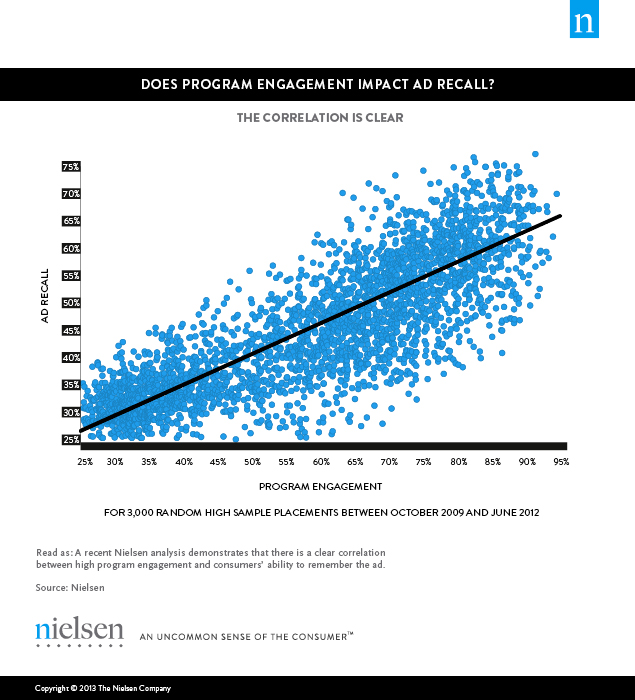It’s been long understood that better ads yield better results, but two new studies by Nielsen prove that better programs have a significant impact on ad performance—and sales.
A recent study of more than 70,000 TV ads (and more than three million ad placements) found a strong relationship between the intensity of a viewer’s engagement with program content and their next-day ability to also remember the content of ads aired during the program. The study found that for every 2 percentage point improvement in a viewer’s program engagement—how well people remember what happened in a TV show they watched the prior evening—advertisers can (on average) expect a 1 percentage point improvement in sustained ad memorability.
Further connecting the dots between program engagement, ad performance and sales, a recent study of consumer packaged goods (CPG) ads from more than 25 different product categories found that the percentage of consumers with sustained/next day memory of an ad is a strong lead-indicator of the ad’s in-market sales impact, as measured by marketing mix modeling. Not surprisingly, when other factors are taken out of the equation, more memorable ads drive more incremental volume.
“For publishers, the clear connection of program engagement and ad memorability reinforces the idea that some content deserves a higher price tag. And, for advertisers and agencies, they should be thinking beyond creative execution to placement,” said Joe Stagaman, Executive Vice President, Ad Effectiveness Analytics, Nielsen. “Since sustained ad memorability is directly tied to sales results, the impact on return on investment is very real.”
The research on program engagement is consistent with Nielsen TV Brand Effect studies over the past 11 years. Program engagement is just one of many factors that affect an ad’s ability to break through the clutter and drive consumer reaction.
The study also found that:
- Creative is still king: In most cases, very good ads will be memorable regardless of the show in which they appear. While the quality and engagement of a program can boost an ad’s performance, bad ads will still be trumped by the best ads—even if they run in the most engaging program.
- Not all program engagement is equal: Because people watch TV differently during the day, the relationship between program engagement and ad memorability is different than it would be during primetime. Likewise, the relationship changes by genre, type of ad, and type of network. For example, NBC’s “Parenthood,” FOX’s “The Following,” CBS’ “Elementary,” ABC’s “Revenge” and The CW’s “Arrow” were all found to be highly engaging primetime dramas. Likewise, “Porque El Amor Manda” and “El Señor de los Cielos,” on Univision and Telemundo, respectively, were found to be among the most engaging telenovelas with Hispanic audiences ages 18-49.
Only through countless studies over the years—and across thousands of ads and millions of ad placements—has the correlation been proven and re-proven.

Methodology [Program Engagement Study]
This analysis was done from 2009 to 2012 with 70,696 ads shown on 66,507 episodes of 6,777 English- and Spanish-language shows on 34 Nielsen TV Brand Effect-measured networks. Program engagement and ad recall was determined by surveying the Nielsen TV Brand Effect panel the day after they saw the program & ad. Then logistic models were created to isolate the effects of 16 ad, show and placement factors (such as ad quality, age of ad, time of day, or genre of show), along with program engagement itself and five cross effects between program engagement and other factors. We then removed the modeled influence of all the non-engagement factors from the ad recall to measure the linear program engagement effect. The graph above is made by randomly picking 3,000 high sample ad placements where the modeled non-engagement factors were removed from the ad content recall.
Program Engagement is defined as the percentage of viewers who can recall within 24 hours the network content they were exposed to during the normal course of viewing TV.
Methodology [Sales Impact Study]
This study, conducted from 2010-2013, includes 97 CPG creatives from over 25 different food/general merchandise/HBA categories. Nielsen conducted an analysis to determine the correlation between the Nielsen TV Brand Effect metric “breakthrough” (% of ad viewers who remember its content a day after viewing) and the marketing mix modeling metric “incremental volume for 100 GRPs.” Both metrics were Normalized (brand mean centered) to control for differing base sizes.



